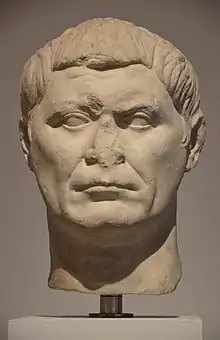Gaius Octavius (father of Augustus)
Gaius Octavius[1] (about 100 – 59 BC) was a Roman politician.
Gaius Octavius | |
|---|---|
 Head of statue, thought to be Gaius Octavius | |
| Born | c. 100 BC Velitrae, Italia |
| Died | 59 BC Nola, Italia |
| Spouse(s) | Ancharia Atia Balba Caesonia |
| Issue | |
| Father | Gaius Octavius |
He was an ancestor to the Roman Emperors of the Julio-Claudian dynasty. He was the father of the Emperor Augustus, step-grandfather of the Emperor Tiberius, great-grandfather of the Emperor Claudius, and great-great grandfather of the Emperors Caligula[2] and Nero.[3] Hailing from Velitrae, he was a descendant of an old and wealthy equestrian branch of the gens Octavia. At Rome his family was part of the wealthy plebeian cast and not being of senatorial rank, he was a novus homo ("new man"). His grandfather, Gaius Octavius, fought as a military tribune in Sicily during the Second Punic War. His father, Gaius Octavius, was a municipal magistrate who lived to an advanced age.
Personal life
Octavius' first wife was named Ancharia. The two had a child named Octavia the Elder. It is not known how the marriage ended, although it is possible that Ancharia died during child birth. Octavius later married the niece of Julius Caesar, Atia Balba Caesonia. How they met is not known, although Atia's family on her father's side (the Atii Balbi) lived close to Velitrae, which was the ancestral home of the Octavii. They had two children: Octavia the Younger (b. 69 BC) and Gaius Octavius (b. 63 BC), who became Roman Emperor Augustus.
Political career
Around 70 BC, Octavius was elected quaestor. In 61 BC, he was elected praetor. In 60 BC, after his term as praetor had ended, he was appointed propraetor, and was to serve as governor (praefectus pro praetor) of Macedonia. However, before he left for Macedonia, the senate sent him to put down a slave rebellion in Thurii. These slaves had previously taken part in the rebellions led by Spartacus and Catiline. Octavius' victory over the slaves in Thurii led him to give his son, then a few years old, the cognomen of "Thurinus". He then left for Macedonia and proved to be a capable administrator, governing "courageously and justly". His deeds included leading the Roman forces to victory in an unexpected battle against the Thracian Bessian tribe. Cicero had high regard for Octavius' diplomatic dealings. Because of his successful term as governor of Macedonia, Octavius won the support necessary to stand for election as consul.
In 59 BC, Octavius sailed to Rome, to stand for election as consul for 58 BC. However, he died in Nola, before arriving in Rome. His career is summarized in an inscription erected by his son on the forum he built in Rome:[4]
- C(aius) Octavius C(ai) f(ilius) C(ai) n(epos) C(ai) pr[on(epos)]
- pater Augusti
- tr(ibunus) mil(itum) bis q(uaestor) aed(ilis) pl(ebis) cum
- C(aio) Toranio iudex quaestionum
- pr(aetor) proco(n)s(ul) imperator appellatus
- ex provincia Macedonia
- “Gaius Octavius, son, grandson and great-grandson of Gaius,
- father of Augustus,
- twice military tribune, quaestor, aedile of the plebs together with
- Gaius Toranius, judge,
- praetor, proconsul, proclaimed imperator
- in the province of Macedonia”
Family tree of the Octavii Rufi
|
Emperor |
|
Consul | ||||||||||||
| Cn. Octavius Rufus q. c. 230 BC | |||||||||||||||||||||||||||||||||||||||||
| Cn. Octavius pr. 205 BC | C. Octavius eq. | ||||||||||||||||||||||||||||||||||||||||
| Cn. Octavius cos. 165 BC | C. Octavius tr. mil. 216 BC | ||||||||||||||||||||||||||||||||||||||||
| Cn. Octavius cos. 128 BC | M. Octavius tr. pl. 133 BC | C. Octavius magistr. | |||||||||||||||||||||||||||||||||||||||
| Cn. Octavius cos. 87 BC | M. Octavius tr. pl. | C. Octavius procos. MAC. 60 BC | |||||||||||||||||||||||||||||||||||||||
| L. Octavius cos. 75 BC | Cn. Octavius cos. 76 BC | C. Octavius (Augustus) imp. ROM. 27 BC–AD 14 | |||||||||||||||||||||||||||||||||||||||
| M. Octavius aed. 50 BC | |||||||||||||||||||||||||||||||||||||||||
Since the last Gaius Octavius (Augustus) was adopted by his great-uncle Julius Caesar and became one of the Julii Caesares, the family's original nomen gentile was not inherited by his only daughter (i.e. Julia the Elder) and adopted sons (i.e. Gaius Caesar, Lucius Caesar, Tiberius, Agrippa Postumus), which meant the end of the Octavii Rufi's male line.
See also
Footnotes
- No ancient source uses a cognomen (surname). The surname Rufus had belonged to his ancestor, Gnaeus Octavius, quaestor circa 230 BC. It was occasionally used (but more often ignored) by his descendants.
- Caligula was a son pf Agrippina the Elder, daughter of Julia the Elder, daughter of Augustus, son of Gaius Octavius (proconsul)
- Nero was a son of Gnaeus Domitius Ahenobarbus (consul 32), son of Antonia the Elder, daughter of Octavia the Younger, daughter of Gaius Ovtavius (proconsul)
- CIL VI, 41023
Sources
| Wikimedia Commons has media related to Gaius Octavius. |
- Suetonius - The Twelve Caesars - Augustus vs. 1-8
- Augustus: The Life of Rome's First Emperor; by Anthony Everitt
